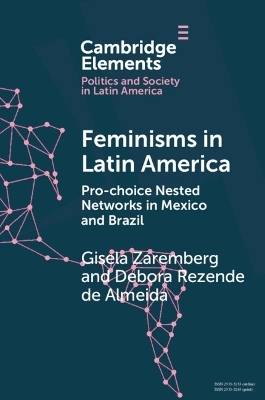
Feminisms in Latin America
Pro-choice Nested Networks in Mexico and Brazil
Seiten
2022
Cambridge University Press (Verlag)
978-1-108-82596-2 (ISBN)
Cambridge University Press (Verlag)
978-1-108-82596-2 (ISBN)
This Element analyzes the features of current feminist movements in Latin America and their responses to conservative reactions. It explores how feminists, leveraging their plurality and connection with the state, can counter conservative attacks.
This Element analyzes the features of current feminist movements in Latin America and their responses to conservative reactions. For this, it focuses on the pro-choice movement vis-à-vis the anti-abortion countermovement in Mexico and Brazil. It offers a relational approach embracing the dynamics within the feminist field and between feminism and the state to capture the movements' potential effects. First, the Element proposes the concept of nested feminist networks, which comprises of three dimensions revealing the plurality of the movement across intersectional and sexual identity issues (horizontal), its relationship with the multifaceted state (vertical), and the intermediation of political parties and participatory institutions in this relationship (intermediary). Second, it argues that nested networks allow feminists to enable policies and block actions from conservatives. In sum, it explores how feminists, leveraging their plurality and connection with the state, can counter conservative attacks.
This Element analyzes the features of current feminist movements in Latin America and their responses to conservative reactions. For this, it focuses on the pro-choice movement vis-à-vis the anti-abortion countermovement in Mexico and Brazil. It offers a relational approach embracing the dynamics within the feminist field and between feminism and the state to capture the movements' potential effects. First, the Element proposes the concept of nested feminist networks, which comprises of three dimensions revealing the plurality of the movement across intersectional and sexual identity issues (horizontal), its relationship with the multifaceted state (vertical), and the intermediation of political parties and participatory institutions in this relationship (intermediary). Second, it argues that nested networks allow feminists to enable policies and block actions from conservatives. In sum, it explores how feminists, leveraging their plurality and connection with the state, can counter conservative attacks.
1. Introduction; 2. Feminism in Latin America; 3. Nested feminist networks in Mexico and Brazil; 4. Abortion rights in Mexico: feminist advances and the backlash at national and subnational levels; 5. Feminist networks in Brazil: blocking anti-abortion conservatives; 6. Conclusions and directions for future research; References.
| Erscheinungsdatum | 21.11.2022 |
|---|---|
| Reihe/Serie | Elements in Politics and Society in Latin America |
| Zusatzinfo | Worked examples or Exercises |
| Verlagsort | Cambridge |
| Sprache | englisch |
| Maße | 152 x 228 mm |
| Gewicht | 150 g |
| Themenwelt | Sozialwissenschaften ► Politik / Verwaltung ► Politische Theorie |
| Sozialwissenschaften ► Politik / Verwaltung ► Staat / Verwaltung | |
| Sozialwissenschaften ► Soziologie | |
| ISBN-10 | 1-108-82596-6 / 1108825966 |
| ISBN-13 | 978-1-108-82596-2 / 9781108825962 |
| Zustand | Neuware |
| Informationen gemäß Produktsicherheitsverordnung (GPSR) | |
| Haben Sie eine Frage zum Produkt? |
Mehr entdecken
aus dem Bereich
aus dem Bereich
Der »progressive« Angriff auf Israel, Judentum und …
Buch | Softcover (2024)
edition TIAMAT (Verlag)
CHF 39,20
ein Vortrag
Buch | Softcover (2024)
Suhrkamp (Verlag)
CHF 13,95
Geschichte, Vordenker, Organisationen
Buch | Softcover (2023)
C.H.Beck (Verlag)
CHF 18,90


